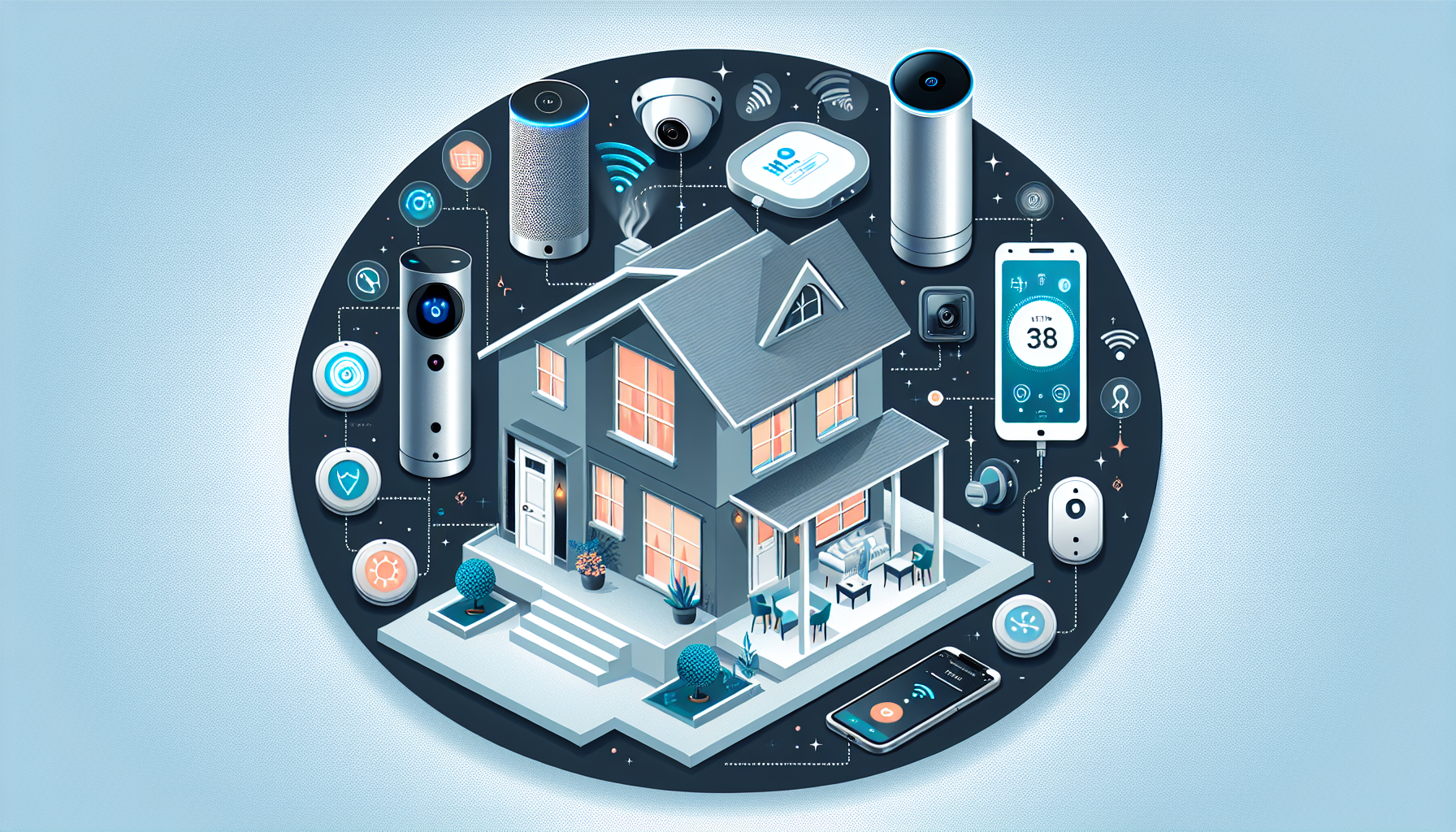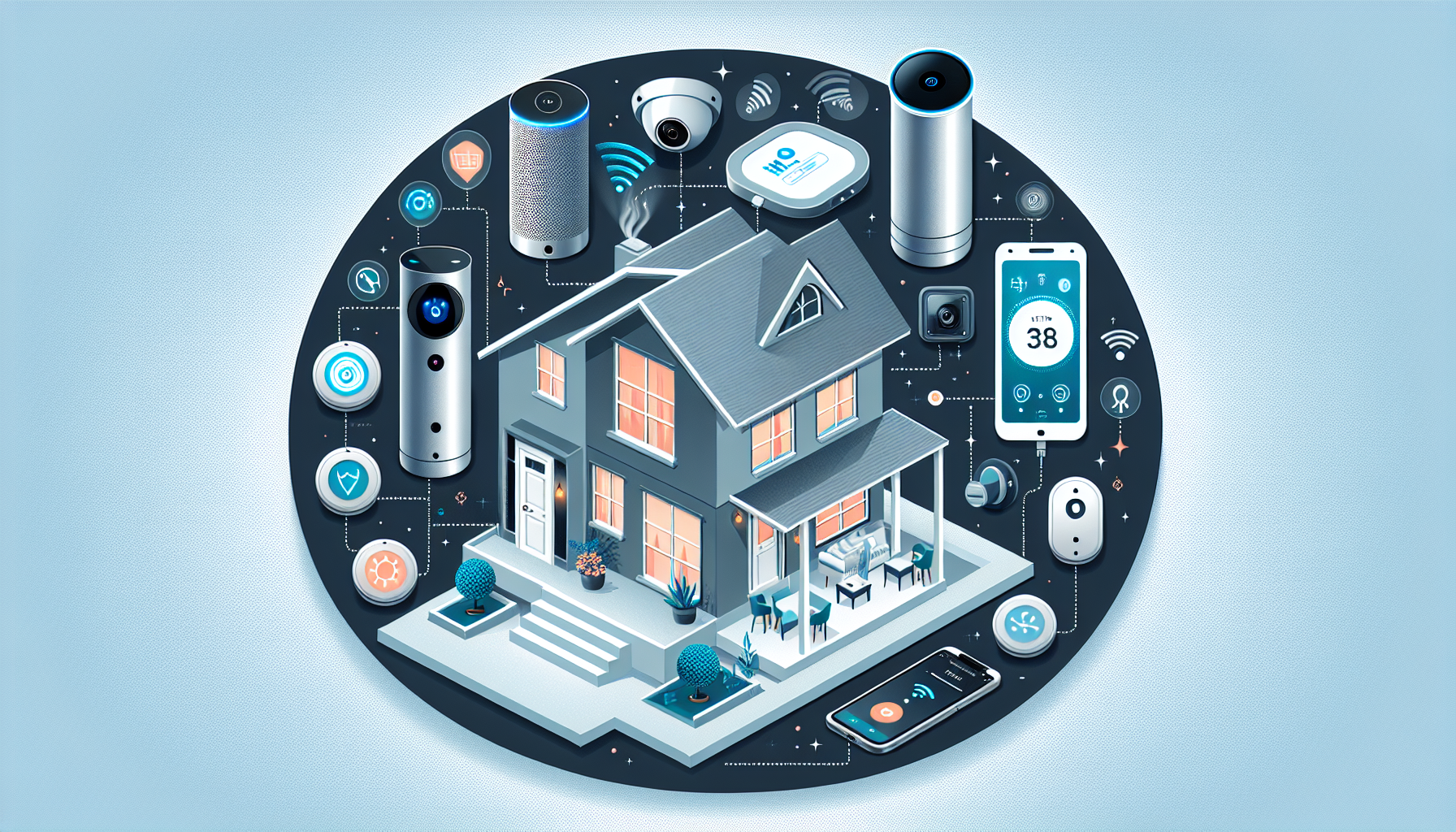Living in a world fueled by technology, it comes as no surprise that our homes too have become intelligent. With the rise of smart homes, you may be wondering what exactly are the key features that make these homes so different from the traditional ones we are accustomed to. From automated lighting systems to voice-controlled virtual assistants, a smart home integrates advanced technologies to streamline and enhance everyday living. Whether it’s the ability to remotely control appliances or the convenience of a connected security system, smart homes offer a plethora of innovative features that are designed to make your life easier and more efficient. Let’s explore some of the most captivating features of a smart home and discover the possibilities they hold for transforming the way we live.
CHECK OUT SMART HOME DEVICES ON AMAZON
Security
When it comes to security, smart home technology offers a range of features to help protect your home and loved ones. Smart locks are a popular choice, allowing you to remotely lock and unlock your doors, as well as provide access codes to family members or trusted individuals. Surveillance cameras provide an extra layer of security, allowing you to monitor your home from anywhere with internet access. Motion sensors can detect any movement in your home and send you alerts, helping to deter burglars. Alarm systems can be integrated with your smart home setup, providing a loud alert in the event of a break-in. Security apps allow you to control and monitor your security devices, ensuring peace of mind even when you’re away from home.
Energy Efficiency
With the increasing focus on sustainability and energy conservation, smart home technology offers numerous solutions to help make your home more energy efficient. Smart thermostats are designed to learn your schedule and adjust the temperature accordingly, saving energy and reducing utility bills. Connected lighting allows you to control your lights remotely, ensuring they are only on when needed. Energy monitoring devices provide real-time information about your energy consumption, allowing you to make informed decisions and reduce waste. Smart appliances, such as refrigerators and washing machines, have energy-saving features and can be scheduled to run during off-peak hours, further optimizing energy usage.
Convenience and Automation
One of the main advantages of a smart home is the convenience and automation it offers. Voice assistants, such as Amazon Alexa or Google Assistant, allow you to control various aspects of your home with simple voice commands. Smart speakers provide high-quality audio and can be used to stream music or access other smart home features. Smart home hubs act as a central control unit, allowing you to manage all your devices from one interface. Automated blinds can be programmed to open and close at specific times, providing privacy and helping to regulate temperature. Smart irrigation systems use weather data to optimize watering schedules, resulting in healthier lawns and reduced water usage.

Entertainment
Smart home technology has revolutionized the way we experience entertainment in our homes. Smart TVs offer a host of features, including streaming services, voice control, and integration with other devices. Home theater systems provide a cinema-like experience with high-quality audio and immersive surround sound. Media streaming devices allow you to access a wide range of online content, from movies and TV shows to music and podcasts. Multi-room audio systems enable you to play different music in different rooms or sync them all for a house-wide party atmosphere. These entertainment features can transform your home into a hub of enjoyment for family and friends.
Health and Well-being
Smart home technology is not limited to security and entertainment; it can also help improve your health and well-being. Smart health monitoring devices, such as fitness trackers or blood pressure monitors, allow you to keep track of your health data and share it with healthcare professionals if needed. Air quality sensors can detect pollutants in your home and provide recommendations for improving air quality, particularly beneficial for individuals with respiratory conditions. Water purification systems ensure that the water you drink and use is clean and free from impurities, contributing to your overall well-being and minimizing the use of single-use plastic bottles.
Appliance Control
Controlling your appliances from anywhere is a significant benefit of a smart home. Smart fridges offer features like inventory tracking, meal planning assistance, and the ability to remotely adjust temperature settings. Smart ovens allow you to preheat or adjust cooking settings remotely, providing convenience and flexibility for busy schedules. Smart dishwashers can be programmed to run at specific times or alert you when they need maintenance. Smart washing machines can be remotely-controlled to start or pause cycles, ensuring your laundry is done on your schedule.
Smart Lighting
Smart lighting can transform your home with its versatility and convenience. Color-changing bulbs offer the ability to customize the ambiance of any room, whether you want a relaxing atmosphere or a vibrant party setting. Motion-activated lights can automatically turn on or off when someone enters or leaves a room, saving energy and providing a hands-free experience. Lighting scenes allow you to set pre-programmed lighting configurations for different occasions, such as movie nights or dinner parties. Timers and scheduling features let you automate your lighting, ensuring that your home is well-lit and welcoming, even when you’re not there.
Home Monitoring
Smart home technology provides various options for monitoring your home and keeping track of activities. Remote access allows you to check in on your home when you’re away, giving you peace of mind and the ability to address any concerns promptly. Activity tracking monitors can detect and notify you of any unusual or unexpected movements or behavior in your home, providing an extra layer of security. Water and leak detection sensors can identify potential leaks or flooding in your home, allowing you to take immediate action and minimize damage.
Communication
Smart home technology enhances communication within and around your home. Video doorbells enable you to see and speak with visitors at your front door, even when you’re not home. Intercom systems allow you to communicate with family members in different parts of your home through voice or video calls, making it easy to relay messages or coordinate activities. Smart display screens can serve as a central hub for communication, displaying calendar reminders, weather updates, or even video calls with friends and family.
Sustainability
Smart home technology can help reduce your environmental footprint and promote sustainability. In addition to smart thermostats, which optimize energy usage, water-saving devices such as smart faucets and showerheads can monitor and regulate water flow, reducing waste without compromising functionality. Solar panel integration allows you to harness the power of the sun to generate electricity for your home, reducing reliance on traditional energy sources and lowering your carbon footprint. By embracing these sustainable features, you can contribute to a greener future while enjoying the comfort and convenience of a smart home.
In conclusion, a smart home offers a wide range of features and benefits across various aspects of your life. From enhanced security and energy efficiency to convenience, entertainment, and improved health and well-being, smart home technology can transform your living space into a more comfortable, secure, and sustainable environment. With the ability to control and monitor your home from anywhere, you can have peace of mind knowing that your home is safe and efficient, while enjoying the convenience and entertainment that smart technology brings. So why not embrace the future and turn your house into a smart home today?

